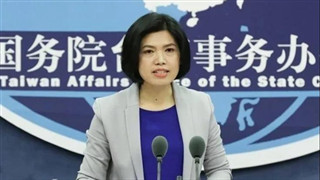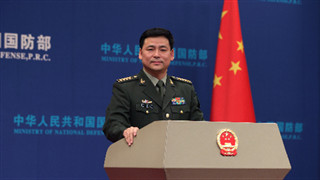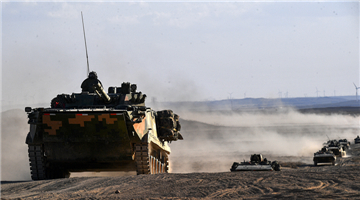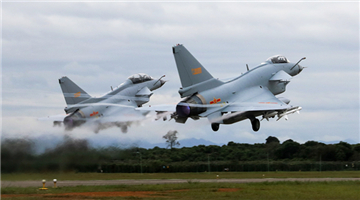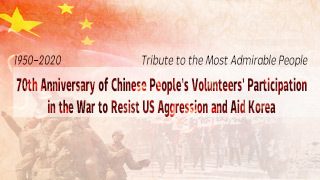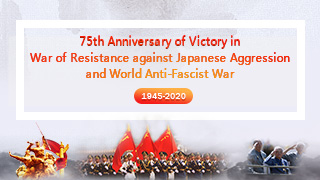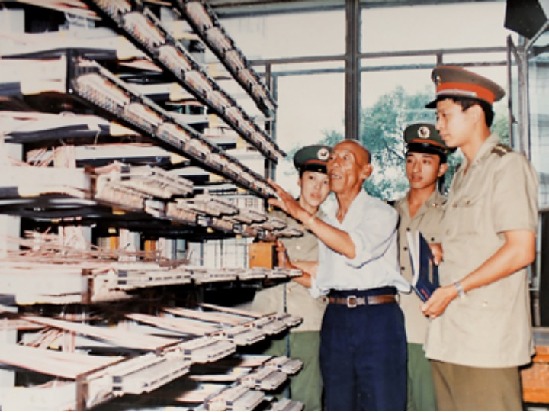
A story featuring a group of Chinese soldiers who over decades ago managed to block the fully equipped US army despite having inadequate weapons has gone viral and influenced millions of Chinese people.
The story from the article Shui Shi Zui Ke'ai De Ren (Who Are the Dearest People) written by Wei Wei was first published on People's Daily and later included in Chinese middle school textbooks.
It depicted one of the bloodiest and bravest battles of Chinese soldiers in the War to Resist US Aggression and Aid Korea, known as the Korean War in the West, from 1950 to 1953. Most soldiers lost their lives in the eight-hour combat.
Li Yu'an and Jing Yuzhuo, two of the soldiers who participated in the fight, decided to conceal their names after returning from the battlefield and led a life as simple as other common people did, refusing to ask for any financial support or gain well-deserved fame.
Although they have been dead for over two decades, their spirit has continued to inspire later generations.
Li survived the 1950 battle severely injured, with his lungs penetrated by bullets, his two ribs broken, and his spine split. Miraculously, eight surgeries saved him from death's hand.
To people's surprise, he kept silent when asked about his identity. He also refused special treatment as a disabled man, thinking it would inconvenience the country.
After the hospital discharged him, Li settled in a township in Northeast China's Heilongjiang province and became a worker in a State-owned granary.
In the resume based on Li's oral account, he presented himself as a former beggar, laborer and later soldier, never mentioning any of his contributions in the war.
Jing Yuzhuo, another soldier in the story who fought in the same battle as Li, also preferred to bury those sacrifices in his heart.
After recovering in the hospital, Jing chose to go back to the countryside and make a living on his own.
Both Li and Jing were unwilling to tell their stories, preferring to commemorate those who died in the battlefield rather than focusing on themselves.
Li's youngest son, for example, once wondered whether his father was the "dearest person" mentioned in the textbook.
On hearing the question, Li couldn't help but fall into tears.
"It's not me. There are too many people who have the same names," he said, denying the truth in his reply.
In the 40 years after the war, both Li and Jing considered themselves as average people and achieved their own values in ordinary jobs with diligence, honesty and dedication to the country.
This lasted until 1990 when a wave of nostalgia surged after people accidentally discovered that Li and Yu were still alive.
On hearing the news about Li, Wei immediately invited him to Beijing. They met, burst into tears and talked deep into the night.
At their departure, Wei gave Li one of his novels and a collection of essays as gifts. He also left some remarks on the title page of the two books:
"I thought in the past that you had become a martyr, but now I know you survived after the injury. I am really happy to see you this time. Wish you a healthy and long life and hope you could continue to serve the country."
"Comrade Li Yu'an, a participant of the glorious Songgufeng battle, will always be the dearest person for us."
On Nov 6, 1990, Li and Jing met in Harbin, capital city of Heilongjiang. These two, who had experienced those dreadful moments together, recognized each other at first glance.
While they finally gained public acknowledgment, their lives hadn't changed.
Li's family of eight spent merely a little more than 50 yuan each month, recalled Yang Xuedong who once accompanied Li to Beijing. Still, Li didn't allow his children to reach out for help.
Jing, much like Li, also relied on himself instead of the country for a living.
People questioned them about why they hadn't asked for rewards, since they made such a great contribution to the country.
Jing offered this answer: "Although Wei Wei put my name in his article, there are also countless soldiers who participated in the war as I did and should be remembered as well. Compared to them, what I have done is nothing worth mentioning.
"I had so many comrades-in-arms, some of them dying at the age of only 18 or 19. They are the ones that should be commemorated. What need is there to talk about me, as long as I am still alive."
According to Li's eldest son, their father told them more than once that he was the only one alive among the over 100 soldiers, and that he should always maintain the spirit of a warrior in order to honor those who died.
Li and Jing kept their promises to always behave like soldiers.
In the 1990s, the main street in the town where Li lived was in urgent need of repairs. He did all he could and raised several million yuan in a short time.
He died in 1997, shortly after the road was renovated, while Jing passed away in 1998.
Still, their spiritual influence remains.
"Li is a common memory of many of those born in the 1980s. The deeds of the old hero should always be remembered by future generations," said Liu Bao, vice-president of Xinglong Second Middle School.
He has visited Li's relatives and colleagues since 2010 and completed a novel about him.
"Only by truly understanding these revolutionary martyrs will we cherish the hard-won peace," said Wang Zhanlong, head of the Publicity Department of Bayan county, in the outskirts of Harbin, Heilongjiang province.
Fortunately, the stories of the two "dearest people" and others like them have not been forgotten.



